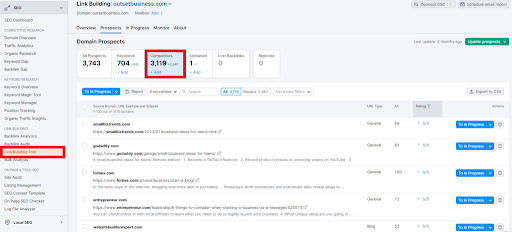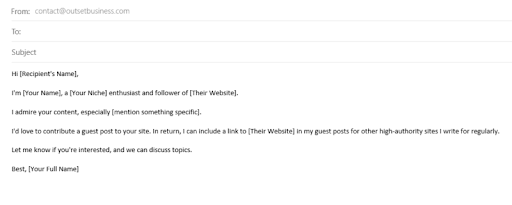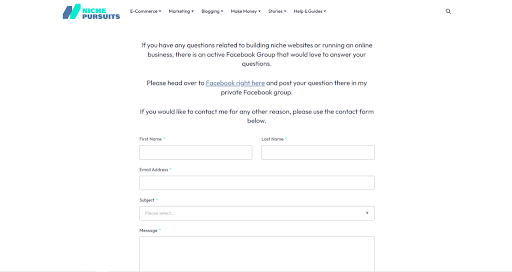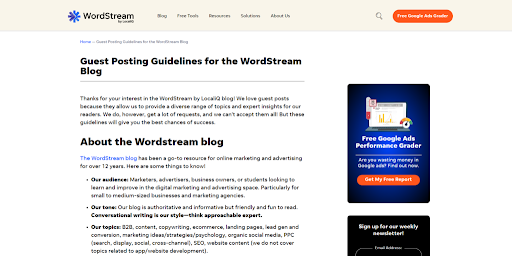Guest Blogging: A Complete Guide for Bloggers in 2024
In 2024, the role of backlinks in blogging has become more important than ever.
Studies show that the number 1 ranking page on Google has an average of around 3.8x more backlinks than pages ranking in positions 2-10.
Crazy, I know.
But the question remains, what’s the best way to build these backlinks as a blogger?
Well, guest blogging (otherwise known as guest posting) is definitely a top strategy.
Guest blogging has become one of the most popular methods to build backlinks as a blogger, offering a powerful way for beginners to boost their website’s SEO ranking.
With huge benefits like increased website traffic, higher authority, and more, there’s absolutely no question why the method is so popular.
What Even is Guest Blogging?
Guest blogging, in simple terms, is a practice where a blogger creates content for another blog or website.
Think of it as a collaborative effort that benefits both parties involved—the guest blogger gains exposure to a new audience and increases their authority, while the hosting site gets fresh and valuable content for free.
This exchange typically includes a bio or author section for the guest blogger, complete with a link back to their own website.
It’s pretty much a win-win strategy that extends the reach of both bloggers and fosters a sense of community.
How to Start Guest Blogging as a Blogger
Now let’s get into the important part – how do you start guest blogging?
We’ll cover all you need to know about getting started from finding guest posting prospects to reaching out to them the right way.
Let’s not waste any time and jump right in!
1. Find Guest Blogging Prospects
Guest blogging starts with finding good websites to host your posts.
But what makes a good website to reach out to?
Look for ones related to your niche, with a decent domain authority between 40 to 80. Avoid low-quality sites – they won’t help your SEO.
Here’s a simple way to find these prospects:
- Identify Competitors Through Keyword Research: Begin by using tools like SEMrush or Ahrefs for keyword research (For this example I’m using SEMrush). Spot your industry’s top competitors, offering a solid starting point for your guest blogging exploration.
- Check Competitor’s Referring Domains: Choose a primary competitor from the tool-generated list. Explore their backlink profile to find sites linking to them. This step unveils websites already interested in your niche.
- Export Referring Domains List: Utilize your SEO tool to export the list of referring domains from your chosen competitor’s backlink profile. This makes it easier to organize and analyze potential prospects.
- Curate a List of Around 100 Sites: Carefully go through the exported list, and get rid of low-quality or irrelevant sites. Concentrate on prospects with domain authorities ranging from 60 to 80. These sites are more likely to welcome guest contributions, offering valuable backlinks for improved SEO.
By following these steps, you’ll now have a list of potential guest posting prospects aligned with your niche and SEO goals.
2. Research for Guest Post Ideas
This step is crucial – actually finding the guest post ideas.
I would personally recommend finding 2 to 4 guest post ideas for the website you’re reaching out to. This way they have just enough but at the same time not too many ideas to choose from.
Here’s how to make sure your topic is good to go:
- Analyze the Website: Start by taking a look at the website. Understand their niche, target audience, and the topics they’ve covered. Find gaps or areas that you can contribute to.
You Need to Pitch a Topic That:
- Is Relevant to Your Brand: Make sure that the topics you choose showcase your expertise without directly promoting your products or services. The focus should be on offering valuable information to the readers.
- Is Interesting to the Site’s Audience: Tailor your idea to cater to the specific interests and needs of the host site’s readers. Consider what type of content would engage and educate them.
- Hasn’t Been Covered on their Site Before: This one is obvious, your guest post should bring something new and unique to the table. Cross-check their existing content to confirm that the idea hasn’t already been explored.
Here’s exactly how to find guest post ideas and ensure they bring a fresh perspective to their existing content.
- Explore Their Existing Content: Begin by taking a look at the website’s current content. Understand their style and the topics they’ve covered to make sure your ideas complement their existing themes.
- Identify Gaps and Opportunities: Search for topics or angles that haven’t been written on yet in their current content. Identify gaps where your unique expertise can bring fresh insights and value to their audience.
- Leverage Keyword Research: Use keyword research tools to find trending topics within your niche. This step ensures your guest post aligns with current interests.
- Analyze Social Media Engagement: Take a peek at their social media platforms to see which topics receive the most engagement from their audience. This provides valuable insights into audience preferences and can guide your content creation.
- Reach Out and Inquire: Consider reaching out to the website and asking about specific topics they might be interested in covering. This direct communication ensures your ideas align with their current content needs and strengthens the collaborative process.
It’s crucial to make sure that your guest post ideas haven’t been previously covered on their website.
This not only showcases your attention to detail but also underscores your commitment to offering unique and valuable content to their readers.
3. Identify Your Value Proposition
Before reaching out to guest blogging prospects, it’s crucial to have a clear value proposition. This acts as your unique selling point, showcasing what sets you apart and why your contribution would be valuable to their audience.
How to Find Your Unique Value Proposition:
To find your unique value proposition, start by assessing your expertise…
Find unique insights or skills you bring to the table, whether it’s your in-depth knowledge, hands-on experience, or a fresh perspective on industry trends.
Next, understand the needs of the host site by gaining a good understanding of their audience and content requirements.
Tailor your value proposition to align with what their readers find valuable and engaging.
Examples of a Unique Value Proposition:
- Value Exchange: “In exchange for writing you this guest post, I also might be able to link back to you on other high authority websites as I write guest posts for multiple high domain authority websites each month”
- In-Depth Industry Insight: “Offering unparalleled insights into [industry], I bring a deep understanding of emerging trends and actionable strategies, ensuring your audience stays ahead in the dynamic landscape.”
- Hands-On Expertise: “With years of hands-on experience in [specific field], I deliver practical and proven solutions that resonate with your audience, offering tangible takeaways they can implement immediately.”
- Fresh Perspective: “Injecting a fresh perspective into common industry challenges, my approach to [topic] promises to captivate your readers with innovative ideas and thought-provoking content.”
Coming up with a value proposition ensures that your outreach is not only targeted but also shows the unique value you bring to the table.
4. Pitch the Guest Post
Before pitching your guest post, carefully read and understand the site’s guidelines. They may have a certain email they want you to pitch to or even a contact form.
How to Find Who to Reach Out To:
Check the “Contact Us” Page:
Image Source: Niche Pursuits
This is by far the easiest way. Start by looking for a “Contact Us” or “Write for Us” page on the website. A lot of time times this page provides details on who to contact for guest post submissions.
Social Media Platforms:
Take a peek at the website’s social media profiles. Sometimes, the person in charge of guest contributions is mentioned in the bio or posts.
Now for the important part, writing the email:
When reaching out for a guest post opportunity, start with a personalized introduction and a brief appreciation for their website.
Present your value proposition, emphasizing the reciprocal benefits.
Introduce your guest post ideas briefly, aligning them with their audience’s interests, and express your eagerness to collaborate.
Also, make sure to keep the tone professional, friendly, and straightforward throughout the email.
Here’s another template you could take inspiration from (I’ve used this in the past and I can confirm it does indeed work):
Hey [Recipient’s Name],
I hope you’re doing well. I’m [Your Name], the owner of [Your Blog/Company], where we specialize in [Your Niche]. Your website caught my eye, and I was impressed by the valuable content your team consistently delivers.
After a bit of research, I noticed some blog topics that haven’t been covered on your site yet and have the potential for traffic.
In fact, your main competitor, [Websites main competitor] has seen success with these topics and has a lower domain authority than you:
- [Guest Post Idea 1]
- [Guest Post Idea 2]
- [Guest Post Idea 3]
- [Guest Post Idea 4]
These topics align perfectly with your audience’s interests and have the potential to drive significant traffic.
Given my expertise in these areas and having covered similar subjects on [Your Blog/Company], I’d love to contribute an SEO-optimized, quality article to your site for free. I’m also happy to promote it across my social media channels.
If this sounds interesting, let me know which topic resonates with you, and I’ll get started on the draft!
Best, [Your Name]
This template not only brings up your value proposition, skill sets, and guest post ideas but it also is said in a friendly yet professional manner.
5. Write the Guest Post
Great, so you’ve reached out to the website and they’ve said yes.
But the job’s not finished.
Checking the website guest post guidelines:
Image Source: WordStream
Begin by checking the website’s guidelines before diving into writing. Familiarize yourself with their preferred article structure, word count, and formatting requirements.
Keeping in mind these guidelines ensures an easy collaboration and increases the chances of your post being accepted without revisions.
Now for writing the guest post:
When drafting your guest post, use relevant keywords for enhanced SEO and align your content with the website’s focus to resonate with its audience.
Mirror the website’s tone of voice, observe its preferred article structure, and prioritize valuable, actionable insights to engage readers.
On top of that, enhance the post with visually appealing elements, ensuring proper usage rights to avoid copyright issues.
By approaching the writing process with careful consideration of the website’s guidelines, SEO best practices, and overall tone, you not only meet the expectations of the hosting site but also create content that resonates with its audience.
This attention to detail enhances the overall success of your guest post.
6. Promote and Monitor the Guest Post
Writing the guest post is just the beginning; effective promotion and monitoring are crucial for its success.
Start by sharing the post across your social media platforms, tagging the hosting website, and using relevant hashtags to broaden its visibility.
Also, you could even explore opportunities for cross-promotion with the hosting website, extending the post’s reach.
This type of approach ensures your guest post not only meets expectations but also maximizes its impact on the hosting website’s audience.
Why is Guest Blogging Important for Bloggers?
Guest blogging holds significant value for bloggers, offering a range of benefits that contribute to the growth and success of their online presence:
- Enhanced SEO Rankings: Guest blogging provides valuable backlinks, significantly boosting a blogger’s SEO and helping them secure higher rankings on search engine results pages.
- Increased Website Traffic: By contributing to other reputable sites, bloggers tap into new audiences, redirecting traffic to their own platforms and expanding their reach.
- Builds Authority and Credibility: Being featured on respected websites establishes bloggers as experts in their niche, earning trust from both readers and search engines.
- Facilitates Networking and Partnerships: The collaborative nature of guest blogging fosters connections within the blogging community, creating opportunities for partnerships, collaborations, and increased exposure.
- Diversifies Content Distribution: Guest blogging is a multifaceted approach that goes beyond content creation, offering a strategic way for bloggers to diversify their content distribution channels and amplify their online presence.
Don’t Write Solely for Backlinks, Write for Authority
While backlinks are valuable, prioritize writing for authority.
Writing high-quality, insightful content establishes credibility, positions you as an industry expert, and resonates more effectively with both audiences and search engines.
By focusing on building authority, you not only enhance your online reputation but also naturally attract valuable backlinks.
Quality content remains the key to sustainable success in the evolving landscape of guest blogging.
Conclusion
That’s it for this guide; thanks for making it to the end!
In conclusion, guest blogging in 2024 is a cornerstone for bloggers, offering essential benefits such as improved SEO, increased traffic, enhanced authority, and valuable networking opportunities.
Embracing this strategy is not just advantageous—it’s a vital element for sustained success in the dynamic online landscape.
But remember, keep in mind your authority and reputation when guest blogging; trust me, don’t guest blog solely for backlinks.
Author Bio:
Young entrepreneur and blogger from New Zealand, Elio Goodrich, is the proud owner and founder of Outset Business, a blog dedicated to helping fellow entrepreneurs start and grow their own online ventures. With early roots in the business world, Elio shares his knowledge and experience to simplify the path to success for like-minded entrepreneurs.
Grow your online brand with exclusive tips from me sent right to your inbox!





Trackbacks/Pingbacks